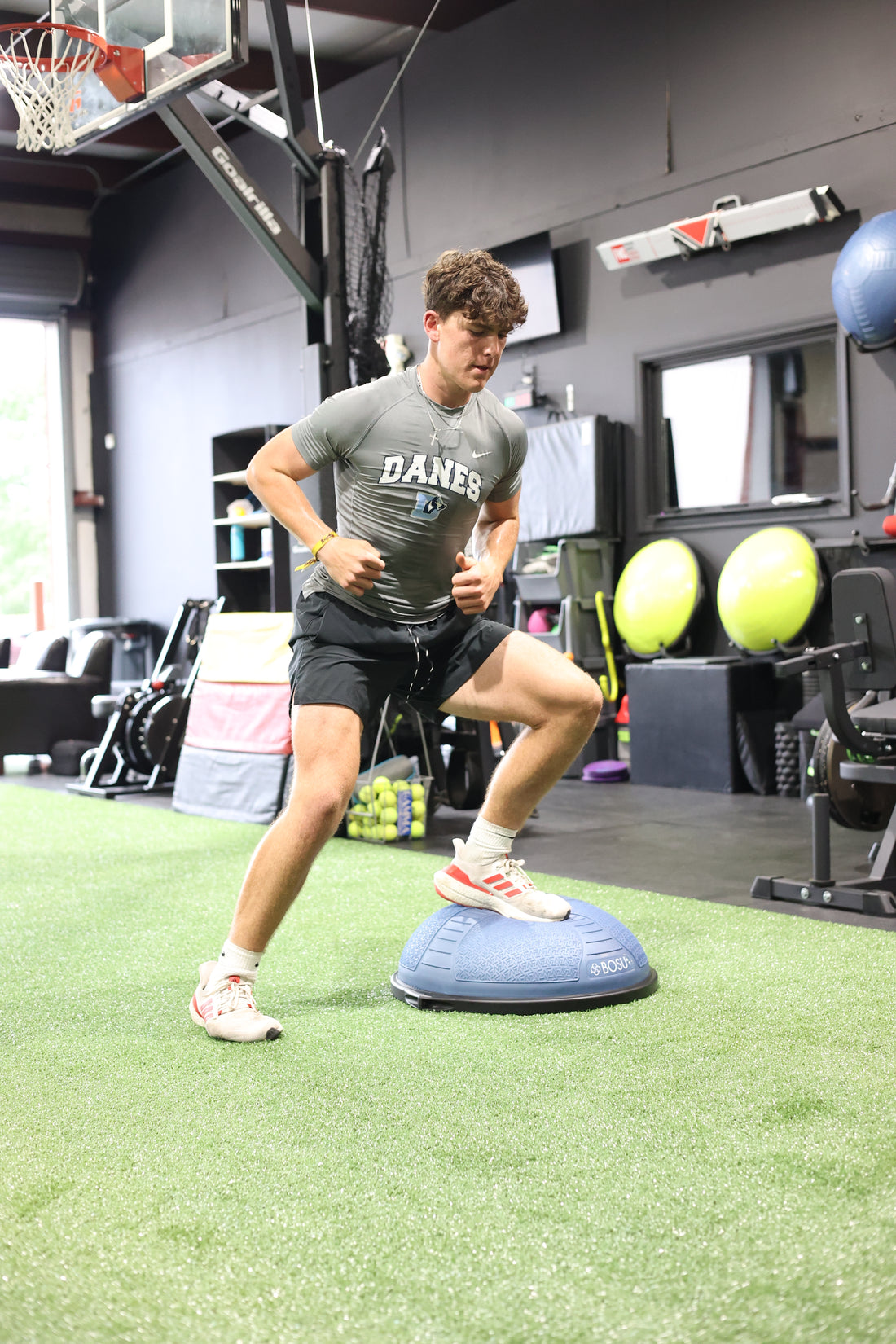
The Power of Nutrition for Athletes
Fueling Athletic Performance

As athletes, our bodies are like high-performance machines, and just like any well-oiled machine, the right fuel is crucial for peak performance. Nutrition plays a vital role in helping athletes reach their full potential, enhancing endurance, strength, and overall athletic performance. In this post we will discuss the essential components of a balanced athlete's diet, exploring the right foods to eat to fuel their bodies for success.
Macronutrients
A balanced athlete's diet begins with macronutrients - carbohydrates, proteins, and fats. Carbohydrates are the primary source of energy for athletes, providing fuel for high-intensity workouts. Proteins are essential for muscle repair and growth, while healthy fats support overall health and hormone regulation.
The Importance of Hydration

Staying hydrated is critical for athletes to perform at their best. Dehydration can lead to decreased energy levels, impaired concentration, and reduced physical performance. Proper hydration before, during, and after training or competition is essential to avoid fatigue and optimize performance.
Pre-Workout Nutrition

What athletes eat before a workout can significantly impact their performance. A well-balanced meal rich in carbohydrates, proteins, and a moderate amount of healthy fats can provide the necessary energy and stamina needed to power through intense workouts.
Here's an example of a balanced pre-workout meal:
Grilled Chicken with Brown Rice and Steamed Vegetables
Ingredients:
- 4-6 ounces of grilled chicken breast (lean protein source)
- 1 cup of cooked brown rice (complex carbohydrates)
- A mix of steamed vegetables (broccoli, carrots, and bell peppers)
Instructions:
1. Grill the chicken breast until fully cooked and tender.
2. Cook brown rice according to package instructions.
3. Prepare a mix of steamed vegetables by lightly cooking them until they are tender-crisp.
4. Serve the grilled chicken over a bed of cooked brown rice and top with the steamed vegetables.
This pre-workout meal provides a balanced combination of macronutrients and micronutrients that are ideal for fueling athletic performance. The grilled chicken is a high-quality source of lean protein, which supports muscle repair and growth. Brown rice offers complex carbohydrates, providing a steady release of energy to sustain prolonged workouts. The mix of colorful vegetables provides essential vitamins, minerals, and antioxidants for overall health and immunity.
It's important to eat this meal at least 1-2 hours before a workout to allow proper digestion and avoid discomfort during exercise. Additionally, athletes may consider adding a small amount of healthy fats, such as avocado or olive oil, to the meal for added satiety and sustained energy. Remember to hydrate adequately before exercising to ensure optimal performance and prevent dehydration.
During-Workout Nutrition

For prolonged workouts or competitions, athletes may need to refuel with easily digestible carbohydrates like energy gels or sports drinks to maintain energy levels and prevent fatigue.
One popular option for during-workout nutrition is a homemade sports drink that provides hydration and a source of carbohydrates.
Here's an example:
Homemade Electrolyte Sports Drink
Ingredients:
- 16 ounces of water
- 1 tablespoon of honey or maple syrup (natural sweetener and source of carbohydrates)
- 1/4 teaspoon of sea salt (electrolytes)
- 1/4 cup of fresh orange juice (vitamin C and natural flavor)
- Optional: a squeeze of lemon or lime juice for added flavor
Shake or stir the ingredients until well combined. Sip this during-workout sports drink throughout your training session to stay hydrated and maintain energy levels. The carbohydrates from honey or maple syrup provide quick fuel for working muscles, while the electrolytes from sea salt help maintain proper fluid balance and prevent cramping.
Remember to listen to your body's hydration needs during exercise, and adjust the amount of the sports drink accordingly. For longer and more intense workouts, you may need to carry a larger container or make multiple servings to stay adequately hydrated and fueled. Always consult with a healthcare professional or registered dietitian if you have specific nutritional needs or health concerns.
Post-Workout Recovery

After intense physical activity, the body needs to recover and repair muscles. A post-workout meal rich in proteins and carbohydrates helps replenish glycogen stores and aids muscle recovery.
Here's an example of a balanced and nutritious post-workout recovery meal:
Grilled Chicken Quinoa Bowl
Ingredients:
- Grilled chicken breast (4-6 ounces) or tofu for a vegetarian option
- 1/2 cup cooked quinoa (a good source of protein and carbohydrates)
- Mixed vegetables (e.g., broccoli, bell peppers, spinach)
- 1/4 avocado (healthy fats for satiety and nutrient absorption)
- Cherry tomatoes (rich in antioxidants)
- Olive oil and lemon dressing (a light and flavorful option)
- Fresh herbs (e.g., basil, cilantro) for added flavor
Instructions:
1. Cook the quinoa according to package instructions and set aside.
2. Grill or bake the chicken breast until fully cooked, or prepare tofu using your preferred method.
3. Steam or sauté the mixed vegetables until tender-crisp.
4. In a bowl, combine the cooked quinoa, grilled chicken (or tofu), and mixed vegetables.
5. Top with sliced avocado and cherry tomatoes.
6. Drizzle with a light dressing made from olive oil and lemon juice.
7. Garnish with fresh herbs for added flavor.
This post-workout meal provides a well-rounded combination of protein, carbohydrates, healthy fats, and essential nutrients to support recovery and muscle repair. The grilled chicken (or tofu) offers a high-quality protein source to help repair and rebuild muscles after exercise. Quinoa is a complex carbohydrate that replenishes glycogen stores, while the mixed vegetables provide essential vitamins and minerals for overall health and recovery. The avocado contributes healthy monounsaturated fats, which aid in nutrient absorption and provide lasting satiety. Cherry tomatoes offer antioxidants that combat oxidative stress caused by intense exercise. The light olive oil and lemon dressing add flavor without overwhelming the meal with heavy ingredients.
Remember that post-workout nutrition should be consumed within an hour to 2 hours, after exercise to optimize recovery. Individual dietary needs may vary, so feel free to adjust portion sizes or ingredients based on your personal preferences and fitness goals. Always listen to your body and consult with a registered dietitian or nutrition expert for personalized nutrition advice.
Embracing Nutrient-Dense Foods
Athletes should focus on nutrient-dense foods that provide a wealth of vitamins, minerals, and antioxidants to support overall health and immunity. Colorful fruits and vegetables, whole grains, lean proteins, and healthy fats are essential components of an athlete's diet.
Nutrient-dense foods are those that provide a high amount of essential nutrients while being relatively low in calories.
Here are a few examples of nutrient-dense foods:
1. Leafy greens: Spinach, kale, Swiss chard, and collard greens are packed with vitamins (such as vitamin A, C, and K), minerals (like iron and calcium), and antioxidants.
2. Berries: Blueberries, strawberries, raspberries, and blackberries are rich in antioxidants, fiber, and vitamins like vitamin C and manganese.
3. Salmon: A fatty fish that is an excellent source of omega-3 fatty acids, protein, and vitamin D.
4. Sweet potatoes: A great source of complex carbohydrates, fiber, and vitamins like vitamin A and potassium.
5. Quinoa: A whole grain that provides complete protein, fiber, and various essential minerals.
6. Eggs: A good source of high-quality protein, vitamins, and minerals, including choline and selenium.
7. Nuts and seeds: Almonds, walnuts, chia seeds, flaxseeds, and pumpkin seeds are rich in healthy fats, protein, and various nutrients.
8. Greek yogurt: Provides protein, calcium, probiotics, and other essential nutrients for gut health.
9. Avocado: A rich source of monounsaturated fats, fiber, potassium, and vitamins C, E, and K.
10. Broccoli: A cruciferous vegetable that is high in vitamins (such as vitamin C and K) and minerals like potassium and iron.
11. Lentils: A legume that offers plant-based protein, fiber, and essential minerals like iron and folate.
12. Oranges: High in vitamin C, potassium, and fiber.
Supplementation with Caution
While a well-rounded diet should meet most athletes' nutritional needs, some may consider supplementation for specific deficiencies. However, it's crucial to consult with a sports dietitian or healthcare professional before starting any supplementation.
Individualizing Nutrition Plans

Every athlete is unique, and their nutritional requirements can vary based on factors like age, gender, sport, and training intensity. A personalized nutrition plan can ensure that athletes are getting the nutrients they need to excel in their chosen field.
Monitoring Progress and Adjusting
Athletes should continually monitor their nutrition and performance to identify areas for improvement. Regular assessments with a sports dietitian can help refine their diet and optimize their athletic potential.
The Mental Aspect of Nutrition
Nutrition not only fuels the body but also the mind. Encouraging a positive relationship with food and cultivating healthy eating habits can boost an athlete's mental resilience and focus.
Nutrition is a cornerstone of athletic success. By understanding the power of proper nutrition, athletes can optimize their performance, reduce the risk of injury, and achieve their goals. Remember, it's not just about what athletes eat on the day of a game or competition; it's about building a foundation of healthy eating habits that will support their athletic journey for years to come. So, let's fuel our bodies with the right nutrients and reach new heights in our athletic endeavors.
Tim Buckley
Creative Dynamic Sports Team
